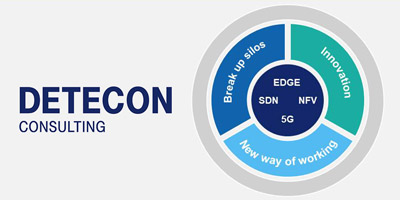New technologies like 5G, edge, softwarization and cloudification will shake up the network factory of telco operators. Stone Age monolithic NT equipment producing plain voice and data services are in the past. The modernization of the network factory opens up new opportunities for telcos to monetarize their network capabilities and increase efficiency significantly.
5G introduces network slicing. Each client will receive a slice of the network with exactly the configuration in terms of latency, bandwidth, availability and security that he needs. For instance, autonomous driving will require low latency and smart grids for utilities in the energy industry will feature high reliability.
Edge computing will shift power and space consuming computing from end customer devices to the edge of the network. Hence, innovative products and services like augmented reality glasses can be introduced. End customer devices will become lightweight and easy to handle because the power consuming computing power is not build in the device itself, but "outsourced" to the network.
Softwarization will prevail and networks will be software programmed. Consequently, proprietary monolithic equipment will be replaced by off-the-shelf hardware and open source principles for which capital expenditure and operational expenditure will be significantly lower than before. Automation will increase efficiency even more and shorten time-to-market.
Cloudification along with softwarization allows a centralization of the network and new synergies by bundling the network steering capabilities. Thus, efficiency will be further increased. The customer will profit from standardized, cross borders services which are fastly scalable. New revenues and business models will emerge, such as the NGENA initiative, a joint venture of more than 12 carriers, which offers multinational services.
The above mentioned technologies allow telcos to move ahead and strengthen their competitive advantage. Services based on the new network capabilities will drive out best-effort services and pave the way to differentiation. The result is a unique selling proposition that is sustainable and difficult to imitate.
But, how can this change be handled and how can this new network factory be successfully introduced? It is not really done with "just" another engineering step towards another technology cycle like in the past when moving from 3G to LTE. It's probably the largest transformation any operator has experienced so far. It's about the holistic value creating approach of the network, including the business model, the culture and the value chain. Detecon identified three principles which guide telcos through this transformation journey and give guidelines to design a new target operating model:
1. New ways of working: A new management self-understanding and mindset of agility is necessary. Decisions shift to the lowest possible layer - close to the operational business to avoid bottlenecks and gain speed. Traditional hierarchy must be overcome. Managers become enablers for decisions rather than gatekeepers for decisions. Furthermore, a skill shift will take place putting more emphasis on agile methods like Scrum and Kanban and programming skills.
2. Convergence to break down silos: Telcos need new structures and procedures to overcome the silos of the legacy world characterized by a high degree of division of labor und specialization. E2E relations must be manageable, speed and flexibility must be ensured. Therefore, working in teams and projects will substitute rigid line work with face-time requirements. DevOps interlinks development and operations teams closer together from the beginning of the value chain and allows a "front loading" of intelligence to avoid mistakes early.
3. Network innovation: The network can emancipate itself from the sheer recipient of demand to the driver for innovative customer propositions. The future network will no longer produce best effort services. Instead, highly differentiated networks services will serve customer´s heterogeneous demands. Additionally, softwarization will pave the way to APIs allowing further recombination with promising technologies like data analytics. However, at the same time the economic belt must also be fastened. Additionally, telcos need a systematic partnering approach in order to amplify the fast and cheap innovation cycles.
The realization of these principles in a new target operating model ensures that the organization can unfold the full potential of the new technologies. It impacts the DNA of the companies and it's maybe the largest change in the history of the company.
The transformation demands a sense of proportion and endurance. For some time legacy systems and new technologies will be operated in parallel. It's necessary to find the right balance between stability and agility.
The transformation marathon can't wait - it's urgent. The main risk will be to start too late. Therefore, the right time to start the transformation is NOW!
By Jörg Borowski, Managing Partner at Detecon
& Birinder Singh Khurana, Senior Consultant at Detecon









